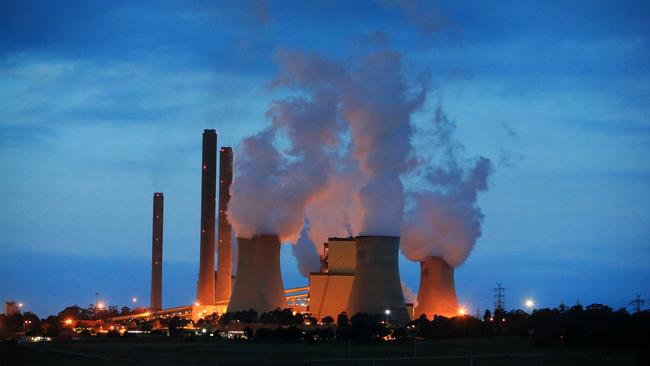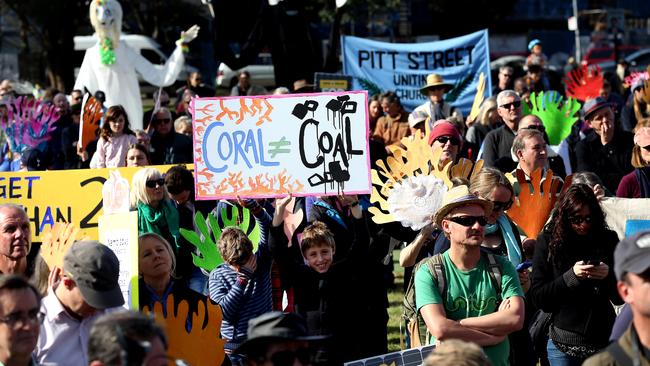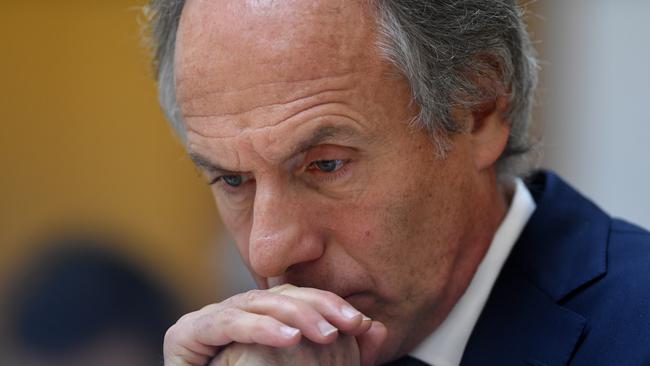Climate change zealots need to get real
THE biggest deniers in the whole climate change debate are those who think we can have affordable power, lower emissions and a reliable network. We can’t, writes Peta Credlin.

Rendezview
Don't miss out on the headlines from Rendezview. Followed categories will be added to My News.
WELL, now we know.
The biggest deniers in the whole climate change debate are those who think we can have affordable power, lower emissions and a reliable network.
We can’t.
And after they almost sleepwalked their way to defeat at the last election, it would appear Coalition MPs have found their voices again on the issue that has defined Australian political debate over the past 15 years or more.
There’s no doubt that any policy that lowers Australia’s CO2 emissions will increase the cost of power and any move away from baseload capacity will make our network more unreliable.
Forget the movie, this is the real “inconvenient truth” that climate change zealots have never wanted to acknowledge. For too long, the views of the Zeitgeist have dominated debate and anyone daring to question any aspect of climate change was branded a sceptic. Scientific fact or not, any issue that’s galvanised the Left to the point of hysteria makes me sceptical that it’s more about the politics than anything else.
Australia contributes 1.4 per cent of global emissions. That’s right — four fifths of bugger all. But for many years we have been told that we must lead the way in reducing global emissions or suffer a loss of international standing for failing to do our bit. I don’t buy this and never have. We’re just the mugs who take these things seriously when so many don’t.
Take Kyoto for example; we didn’t even sign it yet we met the targets. How about the refugee issue? We’re one of only 27 countries in the world that offers resettlement to refugees while 140 odd countries do not.
What’s that again about everyone doing their fair share?

We live in one of the most competitive economic regions in the world. We are also a country rich in natural resources which has delivered us a record-breaking 26 years of economic growth.
We will never beat our neighbours when it comes to cheap labour but Australia’s abundant energy has always been our saving grace. We are the world’s second largest exporter of thermal coal and will soon be the largest exporter of gas. We also have the world’s biggest reserves of uranium. We should be an affordable energy superpower and, 15 years ago, we were; because the power system was run to minimise price and maximise reliability. Affordable power made us highly competitive, delivered industry and jobs, and gave us all a high standard of living.
Since then, green politics has trumped sensible economics and the result is subsidised wind farms and solar panels that make unprofitable the very coal and gas fired power stations that we need for baseload power. It’s a policy induced mess and we’re all paying the price, particularly our small to medium businesses who are doing it tough.
If you’re a well-off greenie with solar panels on the roof, a Prius in the garage and public transport outside your door, you probably don’t mind. In high income electorates feeling good about saving the planet might matter more than keeping the cost of living down.
For everyone else, we want to see a clean environment, good beaches, and our bush protected but we don’t think killing off our industry just to appease the UN gods and various other Lefties makes much sense, particularly when countries like China and India will massively increase, not decrease, their emissions in coming years. Talk about shooting ourselves in the foot. We’re economically shooting ourselves in the head.
Right now, China’s emissions are 20 times those of Australia and even if they meet their Paris Agreement commitments, by 2030, China’s emissions will be 50-60 times ours. Seriously? We sell off industry and jobs in a mistaken belief the world that is acting with similar intent but it is clear they’re not, and won’t. Again, remember my refugee example and you get what I mean.
It’s claimed that the Chief Scientist’s report to COAG aims to address the “trilemma” of achieving lower prices, greater security and a 28 per cent reduction in emissions by 2030. Wrong. The report is about meeting the emissions reduction aspiration (which it converts into a commitment) at the lowest cost without major interruptions to supply. It’s not about affordable, reliable power; it’s about climate change.

As every household knows, power prices are skyrocketing and more blackouts are looming this summer because of government policy that mandates the use of intermittent (and unreliable) wind and solar power. Currently, the “renewable energy target” is 23 per cent, which means a doubling of wind generation in the next four years.
Yet the response of Finkel is to graft a “clean energy target” onto the existing RET to achieve 42 per cent of our power supply from renewable sources by 2030. In other words, he’s proposing to solve the problems caused by too much wind and solar power by having even more wind and solar power.
Reports out of Tuesday’s marathon party room discussion suggest that the Prime Minister’s colleagues are now in no mood to accept yet another giant step towards yet another Labor Party position. After adopting Labor’s policy on schools (Gonski 2.0) and Labor’s position on budget repair (more spending funded by a bank tax), there’s growing resistance to adopting Labor’s position on climate change (a 42 per cent renewable target versus Bill Shorten’s 50 per cent one).
The Prime Minister has said that the alternative to Finkel is to do nothing and that nothing is not an option. So far, though, the party room is unconvinced and is reluctant to embrace a Labor-lite solution to the power crisis that could just make it worse. They won’t accept Finkel’s report as it is, with many fearing his modelling of lower power prices is about as dependable as Treasury’s modelling for a return to surplus.
Around the world, China, India and Japan are massively investing in next generation coal fired power stations because they’re cleaner than any of the generators we have here and coal is still by far the most cost-effective way to generate reliable baseload power. If other countries can build high-efficiency, low-emission power stations to run on Australian coal, why can’t we? If it’s right for them under international agreements, how can it be wrong for us? And if the banks won’t fund them because they need ‘certainty’ then why doesn’t the government get involved?
Clearly there’s market failure here and a risk to Australia’s energy security, as well as the capacity of our industry to remain competitive. Wasn’t market failure one of the reasons the government is spending $50 billion-plus on the NBN?
It’s no good having fast broadband if you can’t turn it on.



